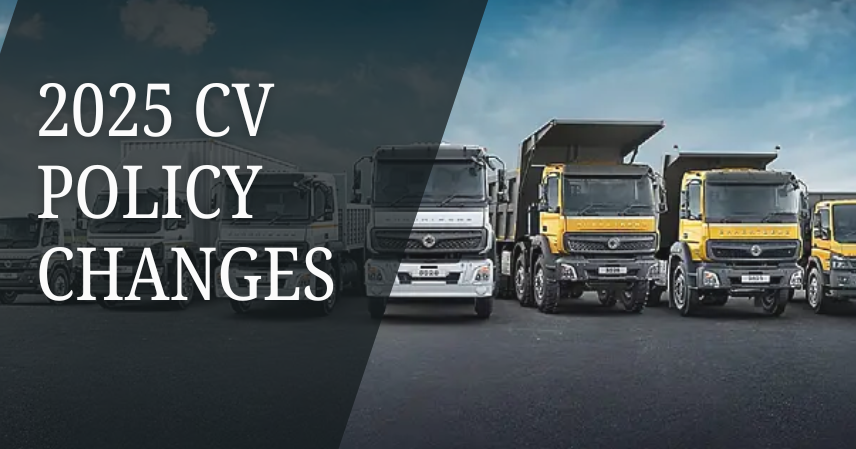India’s Commercial Vehicle Landscape is Shifting — Is Your Fleet Future-Ready?
As India enters a new era of transportation, 2025 brings significant policy updates that directly affect the commercial vehicle (CV) industry. From emission norms and scrappage policies to EV incentives and logistics digitalization, fleet owners need to be informed — and ready to adapt.
If you’re managing a fleet of trucks, buses, or last-mile delivery vehicles, this guide outlines the most important CV policy changes in 2025 — helping you stay compliant, competitive, and ahead of the curve.
BS-VI Phase 2 Norms in Full Effect
What’s Changed?
From April 2023, BS-VI Stage 2 emission norms came into effect, but 2025 marks 100% enforcement with on-board diagnostics (OBD) and real-time emissions monitoring becoming mandatory across all new CVs.
What It Means for Fleet Owners:
- Real-time emission tracking to ensure pollution control.
- Older BS-IV or BS-III vehicles could face restricted access in low-emission zones.
- Maintenance and calibration costs will rise — but it’s better than fines for non-compliance.
Scrappage Policy Enforcement for Heavy-Duty Vehicles
What’s New?
The Vehicle Scrappage Policy, announced earlier, becomes stricter in 2025. Commercial vehicles older than 15 years without fitness certification must be scrapped.
Key Highlights:
- Mandatory fitness tests every year for vehicles over 8 years.
- Failure to pass = vehicle is deemed unfit.
- Penalties and higher taxes on outdated CVs.
What It Means for Fleet Owners:
- Time to audit your fleet age.
- Scrapping incentives for old vehicles available.
- Consider replacing older trucks with BS-VI or EV alternatives.
EV Push: New Subsidies & Mandates for Electric CVs
The Government’s Focus:
To cut urban emissions and reduce fuel import dependency, electric commercial vehicles (e-CVs) are getting a boost in 2025 through revised FAME III policies, local incentives, and new mandates for fleets.
Key Updates:
- Subsidies for electric light commercial vehicles (eLCVs), 3-wheelers, and buses.
- E-commerce and delivery fleets must convert a % of vehicles to EVs (in metro cities).
- Battery swapping infrastructure gets green signal for faster deployment.
For Fleet Owners:
- Incentives can offset high upfront EV costs.
- TCO (total cost of ownership) for e-CVs now matches or beats diesel in city use.
- Time to evaluate fleet electrification plans.
Mandatory Telematics & Vehicle Tracking for Public CVs
What’s Coming in 2025?
The Ministry of Road Transport and Highways (MoRTH) is enforcing stricter vehicle tracking requirements for public CVs like school buses, cargo carriers, and inter-city buses.
Details:
AIS 140-certified GPS devices must be installed in all new CVs.
Fleet operators must maintain tracking logs, driver behavior, and route history.
Fleet Impact:
- Helps improve fleet safety, route optimization, and fuel savings.
- Mandatory for permits and renewals in many states.
- Adds to capex but saves in the long run via data-driven decisions.
New E-Invoicing & FASTag Integration for Commercial Tolling
What Changed:
To streamline logistics and prevent GST evasion, the government is enforcing e-invoicing for transporters and linking FASTag data with fleet GST numbers.
Benefits:
- Simplified toll reconciliation.
- Real-time expense tracking.
- Reduces paperwork delays at checkpoints.
What Fleet Owners Should Do:
- Integrate e-invoicing tools into your fleet ERP.
- Ensure FASTags are active and mapped with correct GSTINs.
City-Level Regulations: Clean Air Zones & Route Permits
Local Rules on the Rise:
2025 sees multiple urban transport reforms in Tier 1 cities like Delhi, Mumbai, Bengaluru, and Pune — all targeting pollution and congestion.
Common Measures:
- Green Zones restricting BS-IV or diesel CV entry.
- Night-time delivery slots to reduce daytime traffic.
- Mandatory route permits for city cargo movement.
Impact:
- Logistics planning gets more complex.
- Non-compliant CVs face fines or entry bans.
- Opportunity to shift to CNG, EV, or hybrid fleets in metro areas.
Incentives for Fleet Digitization & Skill Development
Support for Small Fleet Owners:
- To bring MSMEs into the organized sector, the government in 2025 is offering:
- Grants for fleet management software adoption.
- Incentives for driver training programs and eco-driving certifications.
Why It Matters:
- Digitization = Better mileage, less downtime, route tracking.
- Trained drivers reduce accidents, fuel usage, and breakdowns.
Stay Ahead, Not Behind
- Compliance with national and state laws
- Better fuel economy and lower operational costs
- A safer, cleaner fleet
- Access to green incentives and tech upgrades
Quick Action Checklist for Fleet Owners:
Audit your fleet’s age & emission standard
- Explore EV options where applicable
- Install AIS 140-compliant GPS trackers
- Adopt FASTag-GST integration
- Train drivers on eco-driving practices
- Go digital with fleet management tools
- Watch for city-level permit changes
Final Word:
Commercial vehicles are the backbone of India’s economy, and 2025 policies aim to modernize, digitize, and green this vital sector. Whether you’re hauling freight or running a bus fleet, it’s time to gear up for the future of transportation — smarter, cleaner, and fully compliant.

